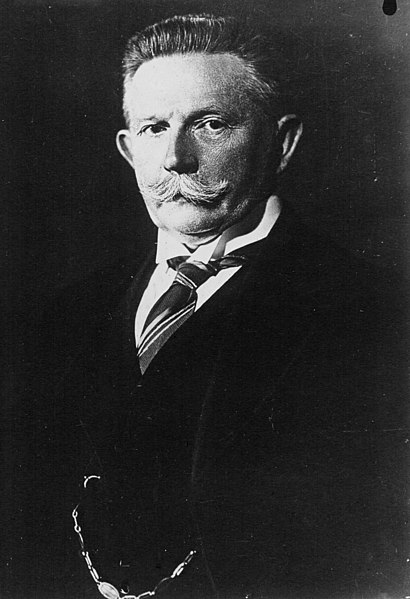Alfred Ernst Christian Alexander Hugenberg was an influential German businessman and politician. An important figure in nationalist politics in Germany during the first three decades of the twentieth century, Hugenberg became the country's leading media proprietor during the 1920s. As leader of the German National People's Party, he played a part in helping Adolf Hitler become chancellor of Germany and served in his first cabinet in 1933, hoping to control Hitler and use him as his tool. The plan failed, and by the end of 1933 Hugenberg had been pushed to the sidelines. Although he continued to serve as a guest member of the Reichstag until 1945, he wielded no political influence. Following World War II, he was interned by the British in 1946 and classified as "exonerated" in 1951 after undergoing denazification.
Hugenberg in 1933
Gustav Krupp von Bohlen und Halbach in 1915
Chancellor Theobald von Bethmann Hollweg in 1913
Heinrich Class, whose plans for a putsch included Hugenberg
German National People's Party
The German National People's Party was a national-conservative and monarchist political party in Germany during the Weimar Republic. Before the rise of the Nazi Party, it was the major nationalist party in Weimar Germany. It was an alliance of conservative, nationalist, monarchist, völkisch, and antisemitic elements supported by the Pan-German League. Ideologically, the party was described as subscribing to authoritarian conservatism, German nationalism, monarchism, and from 1931 onwards also to corporatism in economic policy. It held anti-communist, anti-Catholic, and antisemitic views. On the left–right political spectrum, it belonged on the right-wing, and is classified as far-right in its early years and then again from the late 1920s when it moved back rightward.
A DNVP poster from 1920 showing a Teutonic knight being attacked by Poles and socialists as the caption reads "Save the East"
Clemens von Delbrück served as the DNVP's chief spokesman during the National Assembly that wrote the constitution of 1919.
Karl Helfferich, leader of the DNVP's Reichstag delegation 1919–1924, was well known for his abusive and abrasive style of politics which led to Chancellor Joseph Wirth to accuse him in 1922 on the floor of the Reichstag of moral responsibility for the assassination of Walther Rathenau.
Reinhold Wulle (left) was one of the leaders of the DNVP's völkisch wing in the early 1920s who walked out of the party in 1922.








